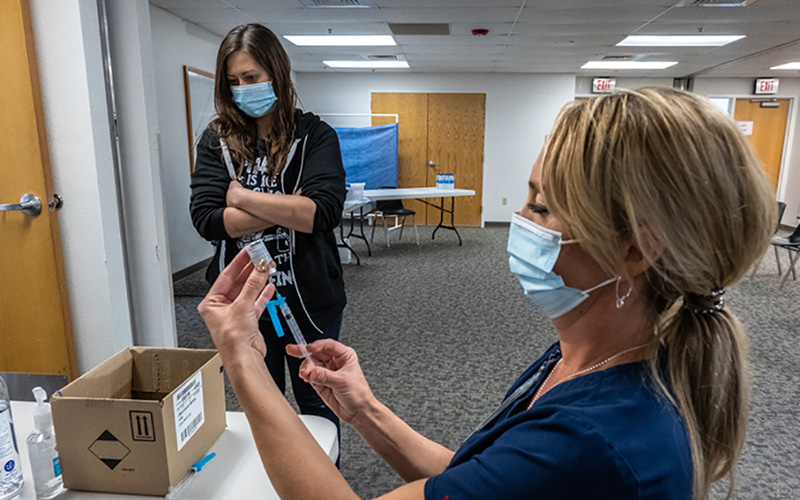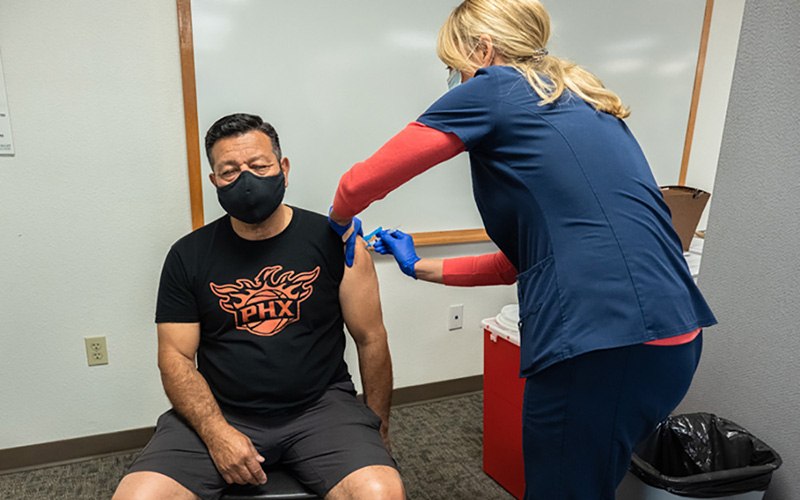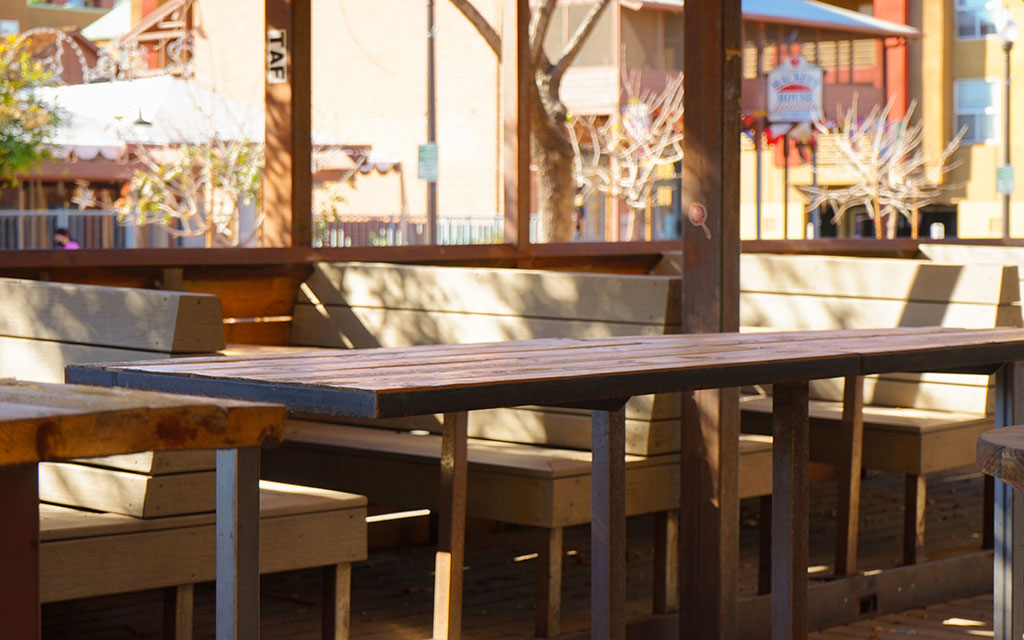
Copper Rim Elementary School paraprofessional Chelsea Holyoak waits to get her second dose of Moderna’s COVID-19 vaccine at Cobre Medical Valley Regional Medical Center on Feb. 26. Gila County became one of the first in the nation to open vaccine registration to any adult resident – something President Joe Biden wants states to do by May 1. (Photo by Juan Arredondo)

Globe Mayor Al Gameros gets his second dose of Moderna’s COVID-19 vaccine at Cobre Medical Valley Regional Medical Center on Feb. 26. Gila County made all county adults vaccine-eligible last month, weeks ahead of President Joe Biden’s call for all adults nationwide to be eligible by May 1, a deadline state officials expect to easily meet, (Photo by Juan Arredondo)
WASHINGTON – Arizona health officials said the state is already on track to meet President Joe Biden’s challenge of allowing all adults to register for COVID-19 vaccinations by May 1.
The directive came Thursday night, the anniversary of the declaration of a COVID-19 pandemic, during Biden’s first nationally televised address as president. He mourned the loss of more than a half-million Americans to the disease but also painted an optimistic picture of the future – including his call for all states to throw open vaccine eligibility by May 1.
“Let me be clear: That doesn’t mean everyone’s going to have that shot immediately, but it means you’ll be able to get in line beginning May 1,” Biden said.
It is unclear what authority Biden has to enforce a deadline, but the director of the Arizona Department of Health Services on Friday called May 1 “a very doable timeline.”
Dr. Cara Christ, the health department director, said that counties are moving at their own pace but that all are currently expected to open eligibility to those 16 years and older by May.
To date, counties have limited registration to phases, with older, ailing and essential workers getting first crack. As of Friday, four counties were administering vaccines to people 65 and older, while nine more had lowered the threshold to people 55 and older.
Two counties, Gila and Greenlee, have already started allowing anyone older than 16 to register for a shot.
Christ said every county in the state should be able to allow the 16-34 age group by the end of April, with smaller counties likely to get there first and larger counties not far behind.
Health officials said the biggest hurdle to a wider rollout may not be logistics but hesitancy among some groups to get the vaccine.
Alexandra Fischer, senior communications manager for Coconino County, said that while vaccine hesitancy has not been a widespread issue, it could be a concern in communities of color who may distrust health officials due to a history of medical mistreatment.
“We know there can be hesitancy, we know there is trauma, so we have to be able to address that,” Fischer said.
That issue was cited Friday morning during a White House briefing on the administration’s COVID-19 plans. Dr. Marcella Nuñez-Smith, senior White House adviser, said during the call that the administration is keenly aware of the distrust and was working to heal the divide.
“We are faced with the reality that marginalized and minoritized communities are often the first to be forgotten,” Nuñez-Smith said. “As we fight against centuries of structural inequities, we must be intentional about making vaccination easy and convenient for everyone.”
White House officials on that call revealed a number of changes to the national vaccine rollout that they said would expedite distribution.
Jeff Zients, White House COVID-19 coordinator, said the administration will increase the number of places that distribute the vaccine, including pharmacies, community health centers and mass vaccination sites. He also said the number of health professionals who can administer shots would be expanded by including dentists, paramedics, trained students and more.
Zients said the country reached an average daily dosage over the past week of 2.2 million shots, what he called a “new record that we will continue to build on.”
Biden’s plan comes as COVID-19 cases in the state and nation continue to decline while vaccinations climb.
In Arizona, almost 1.5 million people have received at least one dose, representing 20.8% of the state population, according to health department data. It said that 870,899 Arizonans have been fully vaccinated.
Christ said the state expects to begin receiving additional shipment of the Johnson & Johnson vaccine next week. That vaccine requires only one dose to be fully effective, unlike others that require two.
County health officials echoed her optimism about expanded vaccination eligibility.
In Gila County, “we’re way ahead of the game, but we’re happy about it,” said Public Health and Emergency Management Director Michael O’Driscoll. He said it has been easier for his county due to its small size compared to the much bigger Pima or Maricopa counties.
“Gila County is more of a rural county than the other bigger counties, who have more logistical issues,” O’Driscoll said Friday.
In his prime-time speech Thursday, Biden expressed hope that through more vaccinations and a continued emphasis on personal safety precautions, the United States might be rounding a corner on the pandemic.
“If we do all this, if we do our part, if we do this together, by July the 4th, there’s a chance you, your families and friends will be able to get together in your backyard … and celebrate Independence Day,” Biden said.


